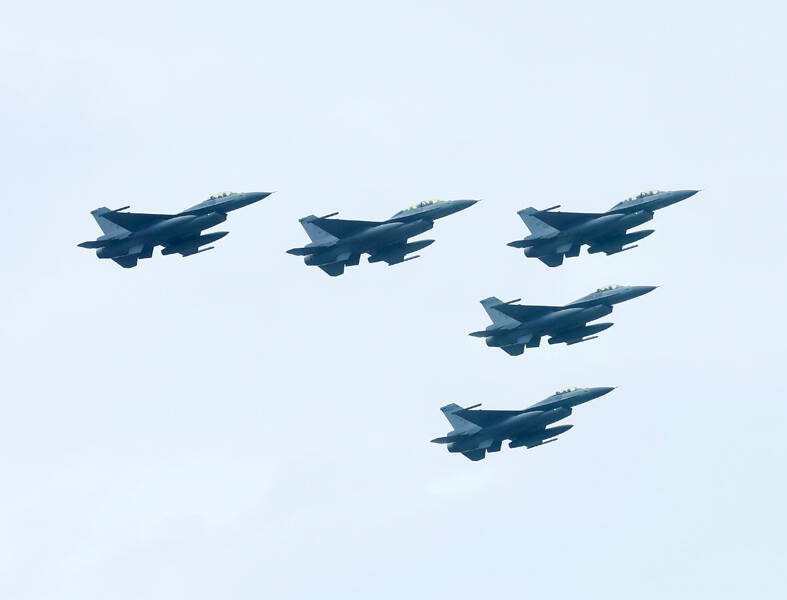Previous technical difficulties related to the nation’s order of 66 F-16V jets have been overcome and the government is hopeful that it would take delivery of all of the planes by the end of 2026, the Ministry of National Defense has said.
The update was given on Friday in a written response to an inquiry from Chinese Nationalist Party (KMT) Legislator Lo Chih-chiang (羅智強) about a delay in the US’ delivery of US$20 billion of weapons systems Taiwan has purchased.
That delay has been partly due to the US prioritizing the supply of weapons Taiwan needs to Ukraine.

Photo: CNA
Citing a Wall Street Journal report, Lo said the delayed items include F-16Vs, Harpoon Coastal Defense Systems, High Mobility Artillery Rocket Systems (HIMARS) and Patriot air defense missile systems.
The ministry said that production of the F-16V jets Taiwan ordered was delayed due to development and software integration issues relating to equipment Taiwan wants installed in the aircraft.
Those issues have been resolved and production of the jets is under way, it said.
The jets should be delivered before the December 2026 deadline as agreed in the contract, it said.
The ministry said it has been working closely with teams from the US Department of State and the US Department of Defense to ensure that the delivery of the weapons, including the Harpoon missiles, the HIMARS rocket launchers and the Patriot missile systems stays on schedule.
Among the provisions in the contract are compensation clauses that set out penalties for contractors that do not meet delivery deadlines for non-force majeure reasons, it said.
Under the clauses, Taiwan would first identify damages it has sustained as a result of the delays and issue a demand for compensation to the US government through bilateral security channels, it said.
Minister of National Defense Wellington Koo (顧立雄) on June 17 told members of the legislature’s Foreign and National Defense Committee that Taiwan expects to take delivery of two F-16V prototypes in the fourth quarter of this year, after which the jets would undergo flight tests.
Taiwan has demanded that the US fill the order of 66 jets by the end of 2026, Koo said at the time.

MORE VISITORS: The Tourism Administration said that it is seeing positive prospects in its efforts to expand the tourism market in North America and Europe Taiwan has been ranked as the cheapest place in the world to travel to this year, based on a list recommended by NerdWallet. The San Francisco-based personal finance company said that Taiwan topped the list of 16 nations it chose for budget travelers because US tourists do not need visas and travelers can easily have a good meal for less than US$10. A bus ride in Taipei costs just under US$0.50, while subway rides start at US$0.60, the firm said, adding that public transportation in Taiwan is easy to navigate. The firm also called Taiwan a “food lover’s paradise,” citing inexpensive breakfast stalls

TRADE: A mandatory declaration of origin for manufactured goods bound for the US is to take effect on May 7 to block China from exploiting Taiwan’s trade channels All products manufactured in Taiwan and exported to the US must include a signed declaration of origin starting on May 7, the Bureau of Foreign Trade announced yesterday. US President Donald Trump on April 2 imposed a 32 percent tariff on imports from Taiwan, but one week later announced a 90-day pause on its implementation. However, a universal 10 percent tariff was immediately applied to most imports from around the world. On April 12, the Trump administration further exempted computers, smartphones and semiconductors from the new tariffs. In response, President William Lai’s (賴清德) administration has introduced a series of countermeasures to support affected

CROSS-STRAIT: The vast majority of Taiwanese support maintaining the ‘status quo,’ while concern is rising about Beijing’s influence operations More than eight out of 10 Taiwanese reject Beijing’s “one country, two systems” framework for cross-strait relations, according to a survey released by the Mainland Affairs Council (MAC) on Thursday. The MAC’s latest quarterly survey found that 84.4 percent of respondents opposed Beijing’s “one country, two systems” formula for handling cross-strait relations — a figure consistent with past polling. Over the past three years, opposition to the framework has remained high, ranging from a low of 83.6 percent in April 2023 to a peak of 89.6 percent in April last year. In the most recent poll, 82.5 percent also rejected China’s

PLUGGING HOLES: The amendments would bring the legislation in line with systems found in other countries such as Japan and the US, Legislator Chen Kuan-ting said Democratic Progressive Party (DPP) Legislator Chen Kuan-ting (陳冠廷) has proposed amending national security legislation amid a spate of espionage cases. Potential gaps in security vetting procedures for personnel with access to sensitive information prompted him to propose the amendments, which would introduce changes to Article 14 of the Classified National Security Information Protection Act (國家機密保護法), Chen said yesterday. The proposal, which aims to enhance interagency vetting procedures and reduce the risk of classified information leaks, would establish a comprehensive security clearance system in Taiwan, he said. The amendment would require character and loyalty checks for civil servants and intelligence personnel prior to